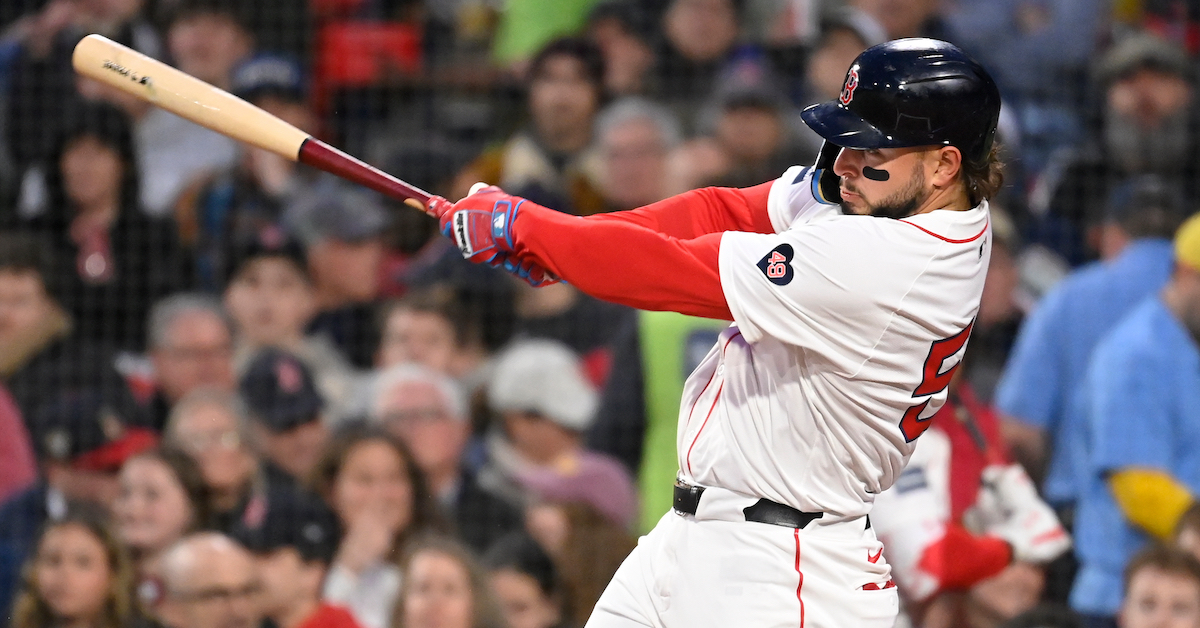
Eric Canha-USA TODAY Sports
Wilyer Abreu has been one of the top rookies in baseball this season. Along with playing above-average defense in right field, the 24-year-old Boston Red Sox outfielder has logged a 155 wRC+ while slashing .316/.396/.519 over 91 plate appearances. His 1.1 WAR ranks second among rookie position players, behind Baltimore’s Colton Cowser. Granted, less than a month’s worth of games is hardly enough time to know if he’ll keep this up, but Abreu’s strong start is encouraging nonetheless.
He similarly impressed last year in a 28-game cameo. Debuting in late August, Abreu went 24-for-76 (.316) with two home runs, the exact same numbers he had this April. There’s juice in his bat. Eric Longenhagen wrote last summer that Abreu “has above-average raw power,” and the youngster’s production has backed up that prose. By the time of his call-up, Abreu had gone yard 22 times, with a 135 wRC+, at Triple-A Worcester.
His path to the big leagues included more than your typical climb up the minor league ladder. The Red Sox acquired Abreu from the Houston Astros, along with Emmanuel Valdez, in the trade for Christian Vazquez on August 1, 2022 — but that’s also only part of the story. The Maracaibo, Venezuela native had intended to sign with Boston in 2016, but the Red Sox were locked out of the international amateur market in 2016-17 as punishment for violating international-signing regulations. Abreu subsequently signed with the Astros in 2017; he waited an extra year to sign because he was told he’d get a better offer if he did.
He’s evolved as a hitter since inking his first professional contract.
“I’ve changed a lot,” Abreu told me recently through translator Carlos Villoria-Benítez. “Maybe the swing is similar to back then, but the posture and the stance have changed throughout the years. Year to year, I was making adjustments, looking for the correct position, correct stance, that was most comfortable.”
Not surprisingly, analytics and technology were involved in the process.
“In Houston, I worked mostly with Blast Motion,” Abreu. said. “I saw the metrics, but I left it to the team to understand them and give me feedback on what I needed to do to become a better player.”
The primary adjustment was the amount of time Abreu was keeping his bat through the hitting zone. Rather than having it go in and out too quickly, he needed for it to “stay on the same plane,” thus necessitating some mechanical tweaks.
“We focused on how to rotate my body without going forward to the ball,” he said. “It was about trying to stay on my back leg and getting my body in a better position to where the bat stayed in the zone longer. It was about staying closed and not over-rotating, and pulling away from the ball.”
That Abreu’s first full season in the Red Sox system was both statistically his best as a professional, and culminated in a big league call-up, was aided by another adjustment. It was two-fold, with the same goal in mind.
“One of the things we worked on after I got here was my hand position,” Abreu said. “Also my stance, I think my stance was a little bit too open. They had me close it a little bit so that my hands are closer to the firing position.”
The purpose of this adjustment was to cut down on the movement in his swing before he attacks the baseball. That brings us to what he feels is the key to his having success at the dish.
“The most important thing for me is to be on time,” Abreu said. “Loading early, getting my heels to the ground to have my rotational power there when the pitch comes, is crucial. For me, timing is everything. If I’m on time, I’m going to hit the ball hard.”
Per Statcast, Abreu’s average exit velocity this year ranks in the 76th percentile at 91 mph. Moreover, his maximum exit velocity has been 114.4 mph — the highest among qualified rookies. Wilyer Abreu can impact a baseball.
Source
https://blogs.fangraphs.com/bostons-wilyer-abreu-has-been-bashing-baseballs/
 Backyard GrillingWeekend WarriorsAdvice from DadBeard GroomingTV Shows for Guys4x4 Off-Road CarsMens FashionSports NewsAncient Archeology World NewsPrivacy PolicyTerms And Conditions
Backyard GrillingWeekend WarriorsAdvice from DadBeard GroomingTV Shows for Guys4x4 Off-Road CarsMens FashionSports NewsAncient Archeology World NewsPrivacy PolicyTerms And Conditions
